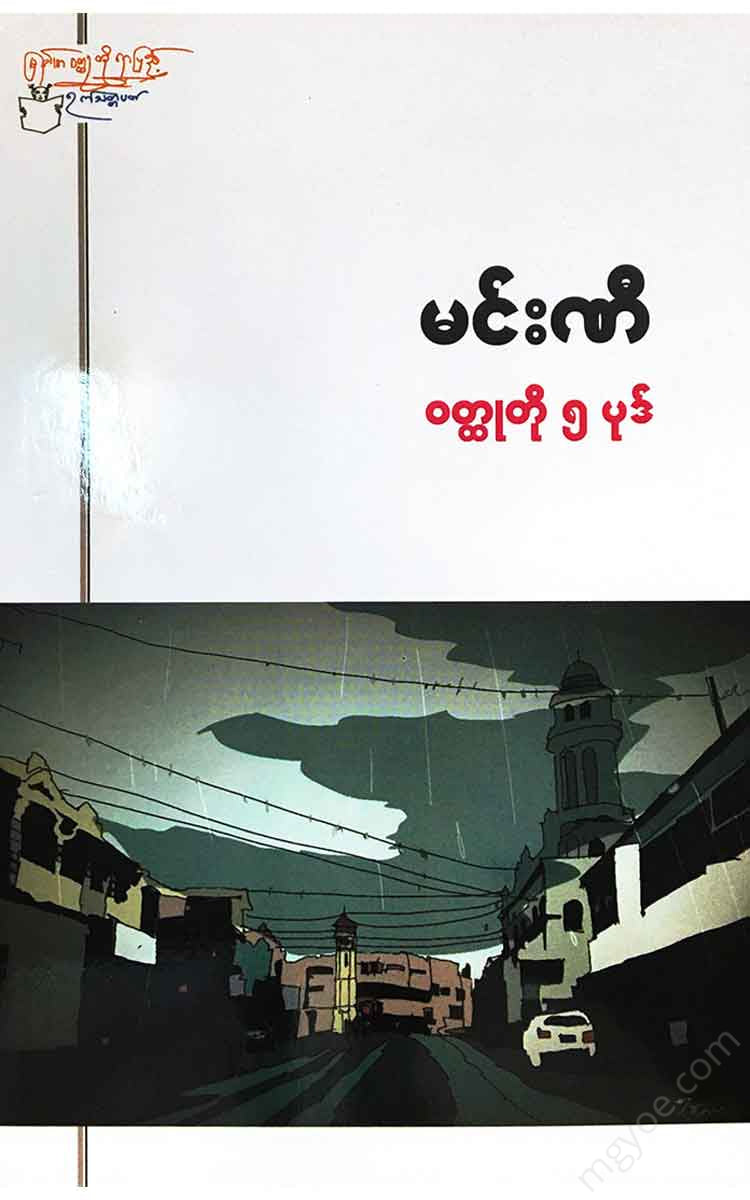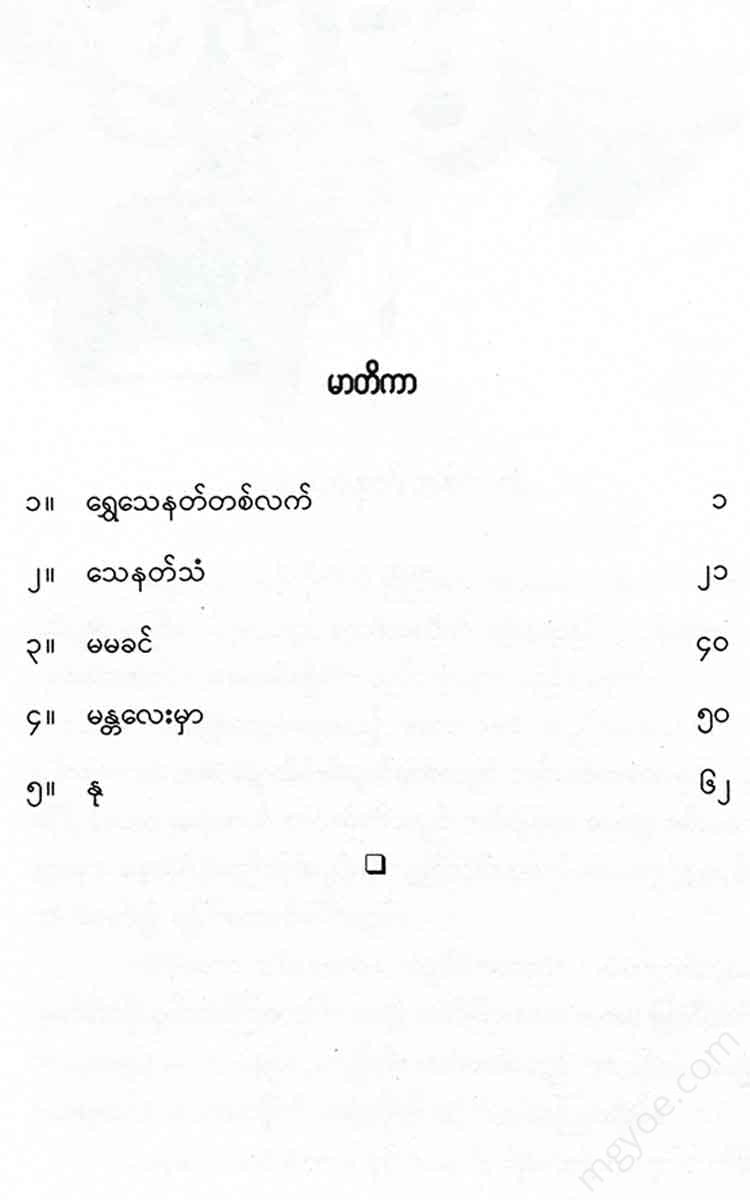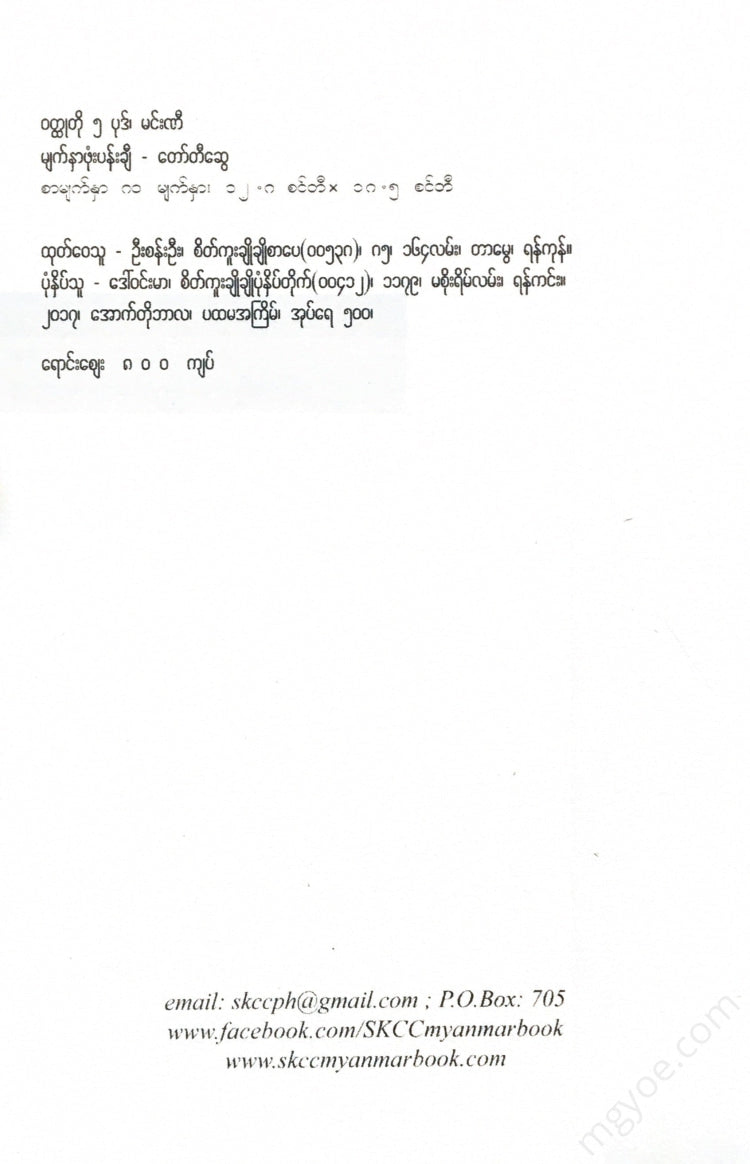စိတ်ကူးချိုချိုစာပေ
Minni - Five short stories
Minni - Five short stories
Couldn't load pickup availability
A golden gun
Uncle Tint Ko Ko's yard was very large. In the past, the entire yard would have been decorated with flowers of different seasons. The colors would be varied. The little daisies would be in the middle of the colorful flowers. In front of the house, there was a tennis court, and you could see how luxurious Uncle Tint Ko Ko once lived as soon as you entered his yard.
Now the tennis courts are in disrepair. Grass sprouts from some of the cracks. The vines of the garden are curling around the fence.
The coconut trees, guava trees, mango trees, and pinna trees, since they are no longer being tended, are growing and ruling as they please. One good thing is that they protect the fragile existence of the little house, and they also provide shade around the yard to keep it cool.
As I looked around Uncle Tint Ko Ko's large yard from my wicker chair, thinking about how it must have once been lush and colorful, and how the gardeners must have kept it clean and tidy, I felt uneasy inside, sighed, and turned to look at Uncle Tint Ko Ko.
Uncle Tint Ko Ko doesn't seem to care at all about the deterioration of his yard. He's in his sixties, so he's given up playing tennis and golf, and has taken to walking, reading, and having his regular glass of whiskey every evening.
Sometimes I would visit him. If I arrived early, he would welcome me with hot water and snacks, and we would talk. If I arrived late in the evening, he would welcome me with a little whiskey.
Now, in the shade of the sugarcane tree next to the tennis court, each of them sitting in a wicker chair, with a large wicker chair in the middle, and a bottle of whiskey on top of it, the two of them were talking.
Uncle Tin Ko Ko's wife is Daw Tin May Gyi, who is an English lecturer at Yangon College. They have only one daughter. Her daughter, Tin May May Ko, is a high school teacher in a high school in Latha Township. She is not married yet.
The way the three fathers and sons lived was honest and peaceful.
Uncle Tint Ko Ko is also a big, handsome man. He only goes to Yangon when he has business to attend to. When he doesn't have any business to attend to, he spends his time reading and sleeping in his yard in Insein village.
They each have a Land Rover to get to work. Without a driver, the three fathers and sons take turns driving.
I had to listen to a strange story from the strange Uncle Hin Ko Ko today. I will retell the story he told under the shade of the sugarcane tree, with the faint smell of whiskey, as he said it. I think you will be interested.
My father's name is very Burmese. But he is very Burmese, not like a person or a name. He is not Burmese in eating, drinking, living, or sitting. Even when he speaks, he speaks Burmese, like a Burmese person.
It's true that people today would find his way of speaking and his way of sitting laughable and questionable.
He doesn't fit in with the times. And they would say he's a bureaucrat. His life path is also strange. I don't even know where to start. His name is Maung Po Tint. He passed his Calcutta matriculation examination in 1908 from St. Peter's School, Mandalay. After passing, he worked as a clerk in the Registrar's Office.
When the First World War broke out, I went to war. I went from Mesopotamia and Italy to France. After the war, I spent six months in England and then returned to India.
Some of the people who went to war with him were returning to Burma from India. If the people who returned from the war were qualified, the British government often gave them small positions and appointed them to the government.
Some have been promoted to deputy mayor, criminal investigation chief in the police department, and forest ranger in the forest department, and they are working peacefully.
Our father had been in India and had served in the Indian Army. That's why his name was Captain Pho Tint, followed by IA. IA doesn't mean the rank of officer. It means "Indian Army". He was also very proud to have risen to the rank of captain in the same rank as the white men. It's rare for a Burmese man to rise to this rank.
After the partition of Burma and India, he returned to Burma. When he returned, he was no longer an Indian Army officer, but a crime officer in the Myanmar Police Force. Since he was a war veteran, he was often referred to as Captain Po Tint, IA, or IPS.
IPS stands for Imperial Police Service. It's on par with the ICS, which is a major force.
Did he go to Yangon and get married to my mother? That story is strange. It must be funny if you hear it. But I have to tell you so that you know what I mean...
.
(2)
We are called the Queen Mother, not the other way around. Our mother is from the royal family. Our father is not from the royal family. So, our father is a writer who has passed the tenth grade, and our mother is a student who has passed the tenth grade from the convent school, and they love each other with the help of the Aungthwetaw.
One day, the elders found the letter that my father had given me. They said that I was not as good as my father Tint, and that Ma May Phewa had to withdraw from Mandalay Upasa College at once. They also made it a strict rule that she could not go out into the compound without an escort.
The bitter words from Mother Feura were also returned to Father through Aungthwe.
Aungthwe also felt angry when the elders of the Queen Mother's family found out about him and forbade him from entering or leaving the house. He would probably say hurtful things.
Here, my father was drafted into the army because of World War I, so he went to war.
Although they have lost contact with each other, the strange thing is that the adults are not accepting Ma May Feyra, no matter who they are.
My father also said, "Look, I had to stay in England. I had been in India for a long time, but I didn't marry anyone of a different race. I was a bachelor until I returned as the Minister of Justice. How can I live with such a heavy heart?"
He worked as a police officer in Yangon for a while and was soon promoted to the rank of Minister of Justice. Then, when the police force was expanded and formed in Mandalay, Upper Burma, he was promoted to the rank of Deputy Commissioner of Police of Upper Burma. Who could hold such a position in Burma at that time? And under him were still the police chief, the police officer, and the Minister of Justice.
My father was a bit strange. I didn't call all those white-faced officers English. I just called them "Gorra". He was very strict when dealing with them. He spoke English to them. He always had a "Stinno" by his side to write down everything he said.
I'll tell you a little bit about his appearance so you can see it clearly.
The brim of the khaki hat he wore was quite high, and the silver ribbon gleamed in front of the brim.
He wears a short-sleeved khaki tunic, and a loose-fitting, flowing silk blouse. He never wears shorts, but usually wears long pants. In the evenings, he sometimes wears riding breeches.
His uniform was always spotless. He always wore the battle badges he had served in the military. He rarely carried a revolver. He always wore the scepter he had worn as a captain around his waist.
He was five feet eleven inches tall, with a slender face, a strong jaw, a broad chest, and a mustache, making him very handsome for his time.
The car he drives is big. It's a German sedan.





